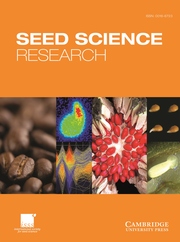Article contents
Identification of biotinylated proteins in soybean [Glycine max (L.) Merrill] seeds and their characterization during germination and seedling growth 1
Published online by Cambridge University Press: 19 September 2008
Abstract
Biotin is an important vitamin. It is biologically active as a protein prosthetic group, where it functions in enzymatically catalysed carboxylation reactions. It has previously been shown that the ability to synthesize biotin is not necessary for germination of Arabidopsis thaliana seeds, but that this process is required for early seedling growth. This research was conducted to determine if changes in the detection of biotinylated proteins could be observed that reflect changes in the need for biotin-mediated enzyme reactions observed during early soybean seedling growth. A seed specific 75-kDa biotinylated protein present in the embryonic axes and the cotyledons was lost during the first 3 d of germination. Seed specificity, and pattern of expression during germination suggest that this protein is a homologue of the seed specific 65-kDa biotinylated protein previously identified in pea (Pisum sativum). If samples were not treated with 2-mercaptoethanol, three equally spaced proteins at approx. 85 kDa were visible. In the presence of 2-ME these proteins appeared as a single 85-kDa band. This triplet was distinct only in the embryonic axes of dry seeds and not in imbibed seeds or in other plant parts. This demonstrates that imbibitional changes do occur in the pool of biotinylated proteins present in dry soybean seeds, and that 2-ME treatment can inhibit complete identification of the biotinylated proteins present in seed tissues.
- Type
- Physiology and Biochemistry
- Information
- Copyright
- Copyright © Cambridge University Press 1997
Footnotes
Research funded by USDA-ARS and Embrapa-Brazihan Corporation for Agricultural Research
References
- 7
- Cited by


